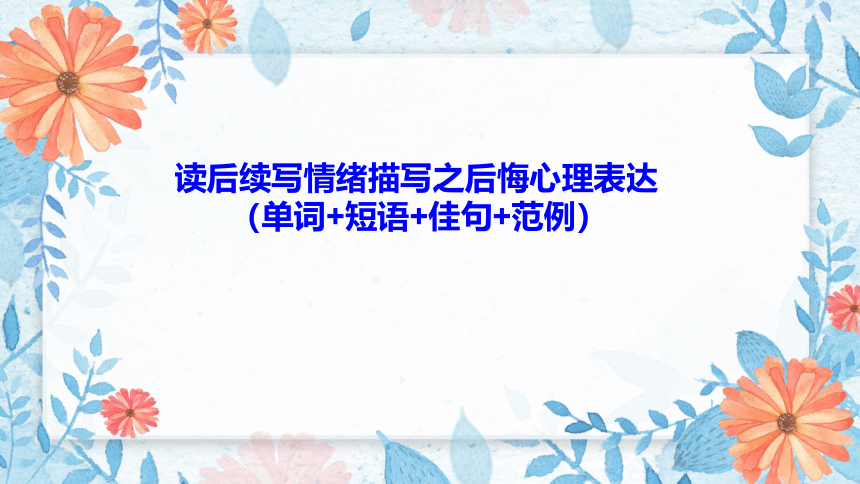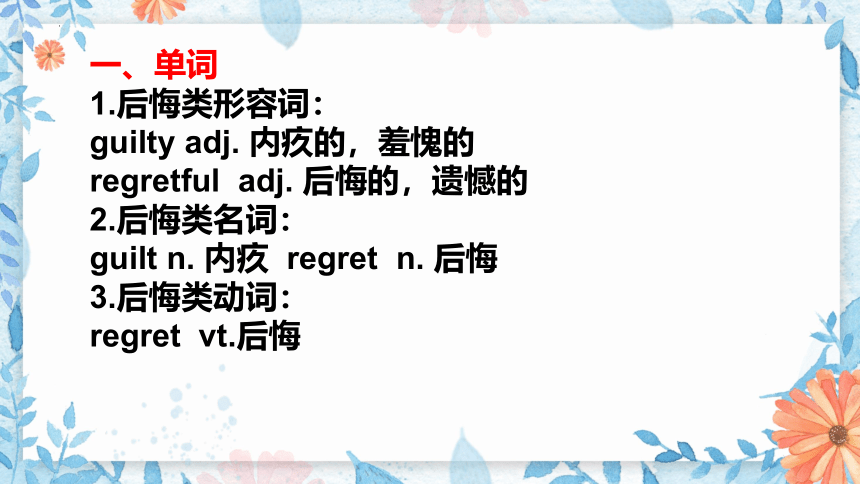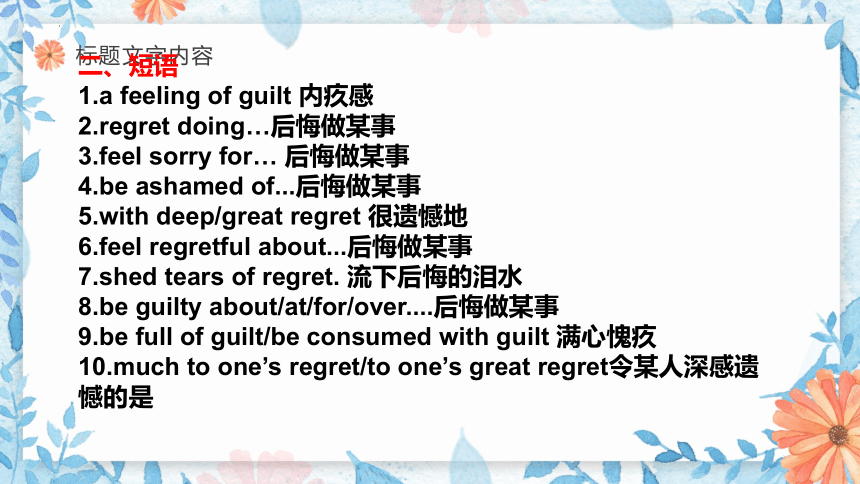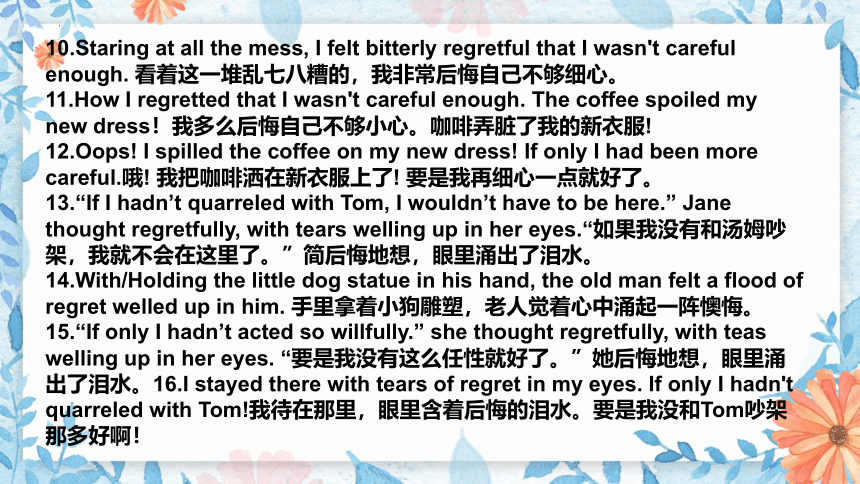2024届高三英语二轮复习写作专项:读后续写情绪描写之后悔心理表达 课件(共11张PPT)
文档属性
| 名称 | 2024届高三英语二轮复习写作专项:读后续写情绪描写之后悔心理表达 课件(共11张PPT) |  | |
| 格式 | pptx | ||
| 文件大小 | 2.5MB | ||
| 资源类型 | 教案 | ||
| 版本资源 | 通用版 | ||
| 科目 | 英语 | ||
| 更新时间 | 2024-04-13 18:08:34 | ||
图片预览





文档简介
(共11张PPT)
读后续写情绪描写之后悔心理表达
(单词+短语+佳句+范例)
一、单词
1.后悔类形容词:
guilty adj. 内疚的,羞愧的
regretful adj. 后悔的,遗憾的
2.后悔类名词:
guilt n. 内疚 regret n. 后悔
3.后悔类动词:
regret vt.后悔
二、短语
1.a feeling of guilt 内疚感
2.regret doing…后悔做某事
3.feel sorry for… 后悔做某事
4.be ashamed of...后悔做某事
5.with deep/great regret 很遗憾地
6.feel regretful about...后悔做某事
7.shed tears of regret. 流下后悔的泪水
8.be guilty about/at/for/over....后悔做某事
9.be full of guilt/be consumed with guilt 满心愧疚
10.much to one’s regret/to one’s great regret令某人深感遗憾的是
三、佳句
1.Jane regret over what she had done.简对自己所做的事感到后悔。
2.I was feeling a strange sense of guilt.我感到一种奇怪的恐惧感内疚。
3.I suddenly felt guilt growing inside me. 我突然感到内心越来越内疚。
4.Filled with guilt, I rushed out to apologize to Tom.我满怀内疚,冲出去向Tom道歉。
5.She wanted to say sorry to Tom for losing her temper. 她想对汤姆发脾气说声对不起。
6.I regret that I am unable to accept your kind invitation. 很遗憾,我不能接受你的友好邀请。
7.Looking at Tom’s face wet with tears, I began to feel guilty.看着Tom泪流满面的脸,我开始感到后悔和内疚。
8.I was overcome by a wave of guilt and words failed to express my regret. 我被一阵内疚所压倒,言语无法表达我的遗憾。
9.Had I not misunderstood him then, everything would be different now!如果我当时没有误解他,现在一切就都不一样了!
10.Staring at all the mess, I felt bitterly regretful that I wasn't careful enough. 看着这一堆乱七八糟的,我非常后悔自己不够细心。
11.How I regretted that I wasn't careful enough. The coffee spoiled my new dress!我多么后悔自己不够小心。咖啡弄脏了我的新衣服!
12.Oops! I spilled the coffee on my new dress! If only I had been more careful.哦! 我把咖啡洒在新衣服上了! 要是我再细心一点就好了。
13.“If I hadn’t quarreled with Tom, I wouldn’t have to be here.” Jane thought regretfully, with tears welling up in her eyes.“如果我没有和汤姆吵架,我就不会在这里了。”简后悔地想,眼里涌出了泪水。
14.With/Holding the little dog statue in his hand, the old man felt a flood of regret welled up in him. 手里拿着小狗雕塑,老人觉着心中涌起一阵懊悔。15.“If only I hadn’t acted so willfully.” she thought regretfully, with teas welling up in her eyes. “要是我没有这么任性就好了。”她后悔地想,眼里涌出了泪水。16.I stayed there with tears of regret in my eyes. If only I hadn't quarreled with Tom!我待在那里,眼里含着后悔的泪水。要是我没和Tom吵架那多好啊!
四、范例
阅读下面材料,根据其内容和所给段落开头语续写两段,使之构成一篇完整的短文。
Our church congregation (集会) in Toronto has a way of assisting those who have financial difficulties without making the receiver feel shame or guilt. Money is dropped into an offering box with only the name of the receiver on the envelope. The envelopes are then distributed to those members without them knowing the name of the giver. There came a time when my husband and I were among those in need. Both of us lost jobs at that time and there was little hope that we could be employed within a short time. Of course, out of self-esteem (自尊), we did not talk about our financial difficulty with anyone else. The only reason our children knew was that we had to cut back on many things. Still, we hoped they were not aware of the extent of our need, nor of how much their father and I were suffering because of it. We did not want to burden them with a problem they could do nothing to solve.
With time going by, our situation wasn’t improving, and my husband and I knew that we would have to look for outside help. In that cold winter, just as we reached the point of despair, our church gave us a gift envelope that had been left in the offering box. You couldn’t imagine how overjoyed we were on receiving such a very substantial amount of money, which was enough to bring us through that desperate time. We couldn’t help but wonder who had given such a generous gift. We were extremely relieved and enormously grateful. In this way, we could survive this tough period with the money. Besides, we needn’t worry about our son’s university tuition, that is, he needn’t apply for any loan because he had taken a part-time job and worked hard to earn some money since he was nine years old. He had been a paper carrier for The Toronto Star, a car washer, a dishwasher and so on. He had been careful for his small earnings so we had trusted him to leave all his wages with him instead of putting it into the bank towards his education.
Paragraph1:A year later, our son was applying for a student loan.
Paragraph2:Finally, in tears, and with great unwillingness, my son told us the truth.
【满分范文】A year later, our son was applying for a student loan. It was then that we discovered his savings account was almost empty. What disturbed us was that he might abuse the money. Therefore, we required him to tell us where the money had gone in a very serious manner. Hesitant and wordless, he lowered his head, with hands tightly clasped and face blushing. The scene that he kept so silent like a statue fueled my anger. Countless doubts roaring in my messy mind, I exploded and yelled “tell me the truth now". Finally, in tears, and with great unwillingness, my son told us the truth. “I sent it to the offering box with your names”, he murmured, tears streaming down his face. His words suddenly hit me like lightening. I was glued to the spot, speechless, with a lump in my throat. The following moment witnessed me wrapping my son in my arms tightly, sobbing and apologizing. Never in my life had I been aware of my son’s love, silent but pure and deep, which had carried our family through the tough time and now warmed my life like sunshine.
【导语】本文以人物为线索展开,讲述了作者和丈夫因为失业有了经济困难,幸亏得到了教会的帮助。他们可以用这笔钱度过这段艰难的时期,并且不需要担心儿子的大学学费。结果一年后发现儿子正在申请学生贷款,追问才得知儿子把自己的积蓄当作礼物送给了急需用钱的父母。
【详解】1.段落续写:①由第一段首句内容“一年后,我们的儿子正在申请学生贷款”可知,第一段可描写作者发现儿子的财务状况有异样以后的反应。②由第二段首句内容“最后,我儿子带着极大的不甘,流着泪告诉了我们真相。”可知,第二段可描写儿子坦白积蓄放在了捐款箱里,以及作者和丈夫感动。2.续写线索:发现储蓄账户是空的——担心钱被滥用——追问儿子——得知真相——感动
3.词汇激活行为类
①发现:discover/find
②要求:require/request/ask
③大喊:yell/shout
情绪类
①激发我的怒火:fuel my anger/arouse my annoyance
②喉咙哽咽:with a lump in my throat/with my throat tightening
【点睛】【高分句型1】What disturbed us was that he might abuse the money. (由what引导d 主语从句,that引导的表语从句)【高分句型2】Never in my life had I been aware of my son’s love, silent but pure and deep, which had carried our family through the tough time and now warmed my life like sunshine.
(由which引导的非限定性定语从句)
Thank you!
读后续写情绪描写之后悔心理表达
(单词+短语+佳句+范例)
一、单词
1.后悔类形容词:
guilty adj. 内疚的,羞愧的
regretful adj. 后悔的,遗憾的
2.后悔类名词:
guilt n. 内疚 regret n. 后悔
3.后悔类动词:
regret vt.后悔
二、短语
1.a feeling of guilt 内疚感
2.regret doing…后悔做某事
3.feel sorry for… 后悔做某事
4.be ashamed of...后悔做某事
5.with deep/great regret 很遗憾地
6.feel regretful about...后悔做某事
7.shed tears of regret. 流下后悔的泪水
8.be guilty about/at/for/over....后悔做某事
9.be full of guilt/be consumed with guilt 满心愧疚
10.much to one’s regret/to one’s great regret令某人深感遗憾的是
三、佳句
1.Jane regret over what she had done.简对自己所做的事感到后悔。
2.I was feeling a strange sense of guilt.我感到一种奇怪的恐惧感内疚。
3.I suddenly felt guilt growing inside me. 我突然感到内心越来越内疚。
4.Filled with guilt, I rushed out to apologize to Tom.我满怀内疚,冲出去向Tom道歉。
5.She wanted to say sorry to Tom for losing her temper. 她想对汤姆发脾气说声对不起。
6.I regret that I am unable to accept your kind invitation. 很遗憾,我不能接受你的友好邀请。
7.Looking at Tom’s face wet with tears, I began to feel guilty.看着Tom泪流满面的脸,我开始感到后悔和内疚。
8.I was overcome by a wave of guilt and words failed to express my regret. 我被一阵内疚所压倒,言语无法表达我的遗憾。
9.Had I not misunderstood him then, everything would be different now!如果我当时没有误解他,现在一切就都不一样了!
10.Staring at all the mess, I felt bitterly regretful that I wasn't careful enough. 看着这一堆乱七八糟的,我非常后悔自己不够细心。
11.How I regretted that I wasn't careful enough. The coffee spoiled my new dress!我多么后悔自己不够小心。咖啡弄脏了我的新衣服!
12.Oops! I spilled the coffee on my new dress! If only I had been more careful.哦! 我把咖啡洒在新衣服上了! 要是我再细心一点就好了。
13.“If I hadn’t quarreled with Tom, I wouldn’t have to be here.” Jane thought regretfully, with tears welling up in her eyes.“如果我没有和汤姆吵架,我就不会在这里了。”简后悔地想,眼里涌出了泪水。
14.With/Holding the little dog statue in his hand, the old man felt a flood of regret welled up in him. 手里拿着小狗雕塑,老人觉着心中涌起一阵懊悔。15.“If only I hadn’t acted so willfully.” she thought regretfully, with teas welling up in her eyes. “要是我没有这么任性就好了。”她后悔地想,眼里涌出了泪水。16.I stayed there with tears of regret in my eyes. If only I hadn't quarreled with Tom!我待在那里,眼里含着后悔的泪水。要是我没和Tom吵架那多好啊!
四、范例
阅读下面材料,根据其内容和所给段落开头语续写两段,使之构成一篇完整的短文。
Our church congregation (集会) in Toronto has a way of assisting those who have financial difficulties without making the receiver feel shame or guilt. Money is dropped into an offering box with only the name of the receiver on the envelope. The envelopes are then distributed to those members without them knowing the name of the giver. There came a time when my husband and I were among those in need. Both of us lost jobs at that time and there was little hope that we could be employed within a short time. Of course, out of self-esteem (自尊), we did not talk about our financial difficulty with anyone else. The only reason our children knew was that we had to cut back on many things. Still, we hoped they were not aware of the extent of our need, nor of how much their father and I were suffering because of it. We did not want to burden them with a problem they could do nothing to solve.
With time going by, our situation wasn’t improving, and my husband and I knew that we would have to look for outside help. In that cold winter, just as we reached the point of despair, our church gave us a gift envelope that had been left in the offering box. You couldn’t imagine how overjoyed we were on receiving such a very substantial amount of money, which was enough to bring us through that desperate time. We couldn’t help but wonder who had given such a generous gift. We were extremely relieved and enormously grateful. In this way, we could survive this tough period with the money. Besides, we needn’t worry about our son’s university tuition, that is, he needn’t apply for any loan because he had taken a part-time job and worked hard to earn some money since he was nine years old. He had been a paper carrier for The Toronto Star, a car washer, a dishwasher and so on. He had been careful for his small earnings so we had trusted him to leave all his wages with him instead of putting it into the bank towards his education.
Paragraph1:A year later, our son was applying for a student loan.
Paragraph2:Finally, in tears, and with great unwillingness, my son told us the truth.
【满分范文】A year later, our son was applying for a student loan. It was then that we discovered his savings account was almost empty. What disturbed us was that he might abuse the money. Therefore, we required him to tell us where the money had gone in a very serious manner. Hesitant and wordless, he lowered his head, with hands tightly clasped and face blushing. The scene that he kept so silent like a statue fueled my anger. Countless doubts roaring in my messy mind, I exploded and yelled “tell me the truth now". Finally, in tears, and with great unwillingness, my son told us the truth. “I sent it to the offering box with your names”, he murmured, tears streaming down his face. His words suddenly hit me like lightening. I was glued to the spot, speechless, with a lump in my throat. The following moment witnessed me wrapping my son in my arms tightly, sobbing and apologizing. Never in my life had I been aware of my son’s love, silent but pure and deep, which had carried our family through the tough time and now warmed my life like sunshine.
【导语】本文以人物为线索展开,讲述了作者和丈夫因为失业有了经济困难,幸亏得到了教会的帮助。他们可以用这笔钱度过这段艰难的时期,并且不需要担心儿子的大学学费。结果一年后发现儿子正在申请学生贷款,追问才得知儿子把自己的积蓄当作礼物送给了急需用钱的父母。
【详解】1.段落续写:①由第一段首句内容“一年后,我们的儿子正在申请学生贷款”可知,第一段可描写作者发现儿子的财务状况有异样以后的反应。②由第二段首句内容“最后,我儿子带着极大的不甘,流着泪告诉了我们真相。”可知,第二段可描写儿子坦白积蓄放在了捐款箱里,以及作者和丈夫感动。2.续写线索:发现储蓄账户是空的——担心钱被滥用——追问儿子——得知真相——感动
3.词汇激活行为类
①发现:discover/find
②要求:require/request/ask
③大喊:yell/shout
情绪类
①激发我的怒火:fuel my anger/arouse my annoyance
②喉咙哽咽:with a lump in my throat/with my throat tightening
【点睛】【高分句型1】What disturbed us was that he might abuse the money. (由what引导d 主语从句,that引导的表语从句)【高分句型2】Never in my life had I been aware of my son’s love, silent but pure and deep, which had carried our family through the tough time and now warmed my life like sunshine.
(由which引导的非限定性定语从句)
Thank you!
